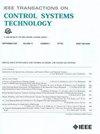Continuous-Time-Constrained Model Predictive Control With a Parallel Solver
IF 3.9
2区 计算机科学
Q1 AUTOMATION & CONTROL SYSTEMS
引用次数: 0
Abstract
In this article, we address the model predictive control (MPC) problem for continuous-time linear time-invariant systems, with both state and input constraints. For computational efficiency, existing approaches typically discretize both dynamics and constraints, which potentially leads to constraint violations in between discrete-time instants. In contrast, to ensure strict constraint satisfaction, we equivalently replace the differential equations with linear mappings between state, input, and flat output, leveraging the differential flatness property of linear systems. By parameterizing the flat output with piecewise polynomials and employing Markov-Lukács theorem, the original MPC problem is then transformed into a semidefinite programming (SDP) problem, which guarantees the strict constraints satisfaction at all time. Furthermore, exploiting the fact that the proposed SDP contains numerous small-sized positive semidefinite (PSD) matrices as optimization variables, we propose a primal-dual hybrid gradient (PDHG) algorithm that can be efficiently parallelized, expediting the optimization procedure with GPU parallel computing. The simulation and experimental results demonstrate that our approach guarantees rigorous adherence to constraints at all time, and our solver exhibits superior computational speed compared to existing solvers for the proposed SDP problem.基于并行求解器的连续时间约束模型预测控制
在本文中,我们解决了具有状态约束和输入约束的连续时间线性定常系统的模型预测控制(MPC)问题。为了提高计算效率,现有的方法通常将动力学和约束离散化,这可能导致离散时刻之间的约束违反。相反,为了确保严格的约束满足,我们等效地将微分方程替换为状态、输入和平面输出之间的线性映射,利用线性系统的微分平坦性。将平面输出用分段多项式参数化,利用Markov-Lukács定理,将原MPC问题转化为半定规划问题,保证了始终满足严格约束。此外,利用所提出的SDP包含许多小尺寸的正半定(PSD)矩阵作为优化变量的事实,我们提出了一种可以有效并行化的原始-对偶混合梯度(PDHG)算法,加快了GPU并行计算的优化过程。仿真和实验结果表明,我们的方法在任何时候都能保证严格遵守约束,并且与现有的SDP问题求解器相比,我们的求解器具有更高的计算速度。
本文章由计算机程序翻译,如有差异,请以英文原文为准。
求助全文
约1分钟内获得全文
求助全文
来源期刊

IEEE Transactions on Control Systems Technology
工程技术-工程:电子与电气
CiteScore
10.70
自引率
2.10%
发文量
218
审稿时长
6.7 months
期刊介绍:
The IEEE Transactions on Control Systems Technology publishes high quality technical papers on technological advances in control engineering. The word technology is from the Greek technologia. The modern meaning is a scientific method to achieve a practical purpose. Control Systems Technology includes all aspects of control engineering needed to implement practical control systems, from analysis and design, through simulation and hardware. A primary purpose of the IEEE Transactions on Control Systems Technology is to have an archival publication which will bridge the gap between theory and practice. Papers are published in the IEEE Transactions on Control System Technology which disclose significant new knowledge, exploratory developments, or practical applications in all aspects of technology needed to implement control systems, from analysis and design through simulation, and hardware.
 求助内容:
求助内容: 应助结果提醒方式:
应助结果提醒方式:


